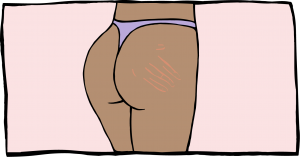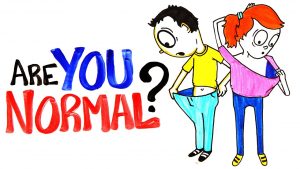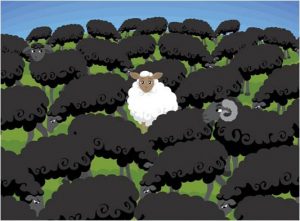normal&abnormalsex

Normal means what is most frequent or average: “On a normal day we sell 2000 pounds of potatoes”, says the manager. If this is applied to sexual behaviour, we can say that a normal couple have more sex during the first years of marriage than during the last.
Normal & abnormal sex: normal sex is good
The problem with the word ‘normal’ is that it is not only a statistical word but also judgmental or normative. Because most people as children want to be ‘normal’ because it is dangerous to be ‘abnormal’, i.e. to deviate from some unspoken rule, the word ‘normal’ has come to mean good. Also, the medical description of people’s anatomy and functions makes normality a very desirable quality. A normal baby is ‘healthy’. Also, society as a whole demands that people behave ‘normally’. A normal person doesn’t go about killing people at random, they say. It always comes as a shock to find that their very normal and respectable functionary or even neighbour turns out to be a mass murderer.
Normal & abnormal sex: abnormal sex is bad
When it comes to sexual behaviour, the word ‘normal’ is problematic. Statistically, most people are heterosexual, marry between eighteen and thirty and have one or more children. Anything that seems to deviate from straight married sex for procreation has at one time been called ‘abnormal’: sex before marriage, adultery, homosexuality, masturbation, but also oral and anal sex, sm, and certainly sex between humans and animals (see Zoophilia), or between adults and children (see Paedophilia). Because of the strong public and private disapproval of ‘abnormal’ sexual behaviour, most people have developed feelings of shame and guilt, particularly because of their masturbation, which is almost universally practised. Most sexual behaviour is thus kept hidden, as are the sex organs themselves.
Normal & abnormal sex: gay emancipation
In certain categories of deviant sexual behaviour, an emancipatory movement has brought them out of the closet. Especially homosexuals have come to be recognized as full citizens, who should be given the same rights and treatment as ‘normal’ people (see Gay marriage). In other words, the demand is to make them ‘normal’ as well. Unfortunately this normality comes at a price. Homosexuals have to appear to be as upstanding, respectable, monogamous family folks as the other ‘normal’ people. Which also means that they must join in the chorus of disapproval of other sexual abnormalities.
Most people have tendencies that deviate somewhat from what even they themselves consider ‘normal’. If this were to be recognized, no separate categories of people would have to be distinguished. For sexual tendencies or preferences do not constitute the identity of a person, as is implied by labeling people as paraphiliacs, but an aspect of their personality.
Normal & abnormal sex: varied behaviour
The problem of sexual normality goes back a long way, but became more and more prominent in the course of the nineteenth century, when modern society became aware of ‘sexuality’, or ‘the sexual problem’. In this period the science of sexology was born, starting with Psychopathia Sexualis by Richard von Krafft-Ebing. The book contains a survey of sexual deviations, including masturbation and homosexuality.
In the natural world, of which humans are a part, there is a combination of two tendencies: the urge for sexual gratification, which is strong and potentially varied across species. At the same time, sex is a function of reproduction, which limits its practice and significance. In humans, the possibility of sexually varied behaviour for the sake of pleasure is greater than in any other species. This led Freud to call the new born human ‘polymorphously perverse’, in other words, a human baby would, if not checked or controlled by cultural moulding, develop all the possible aberrations, perversities, abnormalities, deviations or paraphilias as they are now called. According to Freud (and probably most other people), it is culture which makes a normal person out of the lust driven child animal.
This has been proved to be a mistaken view. The study of animal behaviour during the 20th century revealed that the tendency to become ‘normal’ is also natural in the sense that all animals primarily develop in the direction of reproductive behaviour. This includes looking for a sexual mate, having intercourse until the female is pregnant, then cohabiting to take care of the offspring together, while secretly perhaps looking for another possible mate. This pattern is familiar to us. It is ‘natural normality’. Every behaviour that deviates from this pattern can be, and has been termed ‘deviant’. Since all humans have a large repertoire of sexual expression, for instance masturbation, we are all to some extent ‘deviant’. A better term would be ‘multisexual’.
Normal & abnormal sex: sexual labelling
Therefore, to label people ‘homosexual, pedosexual, transsexual, nymphomaniac, bisexual, exhibitionist, sadomasochist (see Variants) etcetera is to emphasize only one aspect, or even one life event. We are all complex human beings and sexual expression is one aspect of our identity. It is perhaps just a matter of chance that some individuals become obsessed with a particular sexual stimulus, are socially inept in dealing with it, have been arrested, or referred for psychiatric help, and thus constitute the category of ‘deviants’ on whom society projects the forbidden ways of sex. Forbidden, because they detract from normal reproductive behaviour, heterosexual marriage, and family life. The majority of us play this role because it is to our advantage to do so. However, if our true feelings and practices were to become part of the objective body of knowledge we call science, the human repertoire of expression could be opened up and understood instead of tabooed. This is among other things what sexual reform is about.

